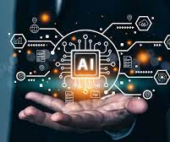Defining the Role of AI Agents
To successfully implement AI agents, organizations must clearly define their function across these five key areas:
- Role – What tasks are they responsible for completing?
- Data – What knowledge and insights can they access?
- Actions – What capabilities do they have to execute tasks?
- Guardrails – What limitations and ethical guidelines must they follow?
- Channel – Where do they interact with customers and teams?
The Evolution of Agentic Automation
Agentic automation represents a major shift in how enterprises leverage AI to drive productivity and efficiency. By seamlessly integrating AI agents, human employees, and automation technologies, businesses can orchestrate complex workflows from start to finish.
AI agents are transforming customer service and business operations. These intelligent systems can plan and execute tasks, make informed decisions, and integrate with existing workflows to deliver superior efficiency.
With the right AI strategy, businesses can elevate customer experiences by offering proactive, personalized, and highly responsive solutions.
The Need for AI Agents
Businesses today face mounting challenges:
- Surging case volumes with limited staff capacity
- The need for 24/7 support despite budget constraints
- Growing customer expectations for faster response times
AI agents like Agentforce provide a scalable solution by automating interactions, streamlining processes, and ensuring continuous availability. Let’s explore what AI agents are, how they work, and how to deploy them successfully.
What is an AI Agent?
An AI agent is an intelligent system that autonomously interacts with customers, processes data, and executes actions without human intervention. Powered by machine learning and natural language processing (NLP), AI agents can:
- Answer inquiries and resolve complex issues
- Handle multiple tasks simultaneously
- Continuously improve performance through self-learning
Unlike traditional automation, AI agents learn from interactions, refine their responses, and adapt to evolving business needs.
Imagine if every employee—from the CEO to the newest sales rep—had an AI-powered assistant. With today’s AI advancements, that vision is becoming a reality.
The Impact of Generative AI Agents
More companies are embracing generative AI agents that leverage trusted customer data to deliver real-time insights. Tasks that once required extensive manual effort—like data analysis, trend forecasting, and customer support—can now be automated, freeing employees to focus on higher-value work.
Beyond customer service, AI agents help businesses scale, meet key performance indicators, and solve problems before they escalate. The potential of this technology is just beginning to unfold.
How AI Agents Work
AI agents operate through a four-step process:
- Perception & Data Collection
- AI agents gather data from interactions, transaction histories, and social media.
- Advanced models process real-time information to enhance accuracy.
- Decision Making
- Machine learning models analyze patterns and determine the best course of action.
- AI agents refine their decision-making over time based on past interactions.
- Action Execution
- Agents respond to inquiries, process requests, or escalate issues when needed.
- Actions are executed seamlessly to ensure fast, accurate responses.
- Learning & Adaptation
- AI agents continuously improve by learning from feedback and interactions.
- They evolve to meet shifting customer expectations and business needs.
By integrating these capabilities, AI agents can autonomously manage tasks like product recommendations, troubleshooting, and proactive follow-ups—allowing human employees to focus on strategic initiatives.
Types of AI Agents
Not all AI agents function the same way. Businesses can leverage different types of agents based on their operational needs:
- Simple Reflex Agents
- Operate on a condition-action basis
- Best for basic chatbots with predefined responses
- Model-Based Reflex Agents
- Use an internal model to infer missing information
- Provide more advanced, context-aware interactions
- Utility-Based Agents
- Weigh different options to choose the best course of action
- Useful for decision-heavy tasks like logistics or autonomous vehicles
- Goal-Based Agents
- Make decisions based on achieving a specific goal
- Ideal for complex problem-solving scenarios
- Learning Agents
- Continuously improve through reinforcement learning
- Well-suited for adaptive virtual assistants and predictive analytics
- Hierarchical Agents
- Structure tasks into multi-level processes
- Enable scalability by distributing work across multiple AI sub-agents
The Future of AI Agents
AI-driven automation is redefining the way businesses operate. From enhancing customer experiences to optimizing internal workflows, AI agents are becoming indispensable tools for modern enterprises.
As organizations invest in AI strategies, the key question remains: Are you ready to harness the full potential of AI agents to drive business success? Contact Tectonic today!
By Tectonic Marketing Operations Director, Shannan Hearne














